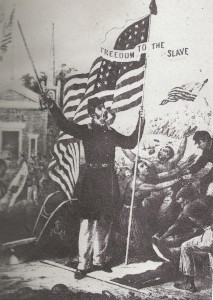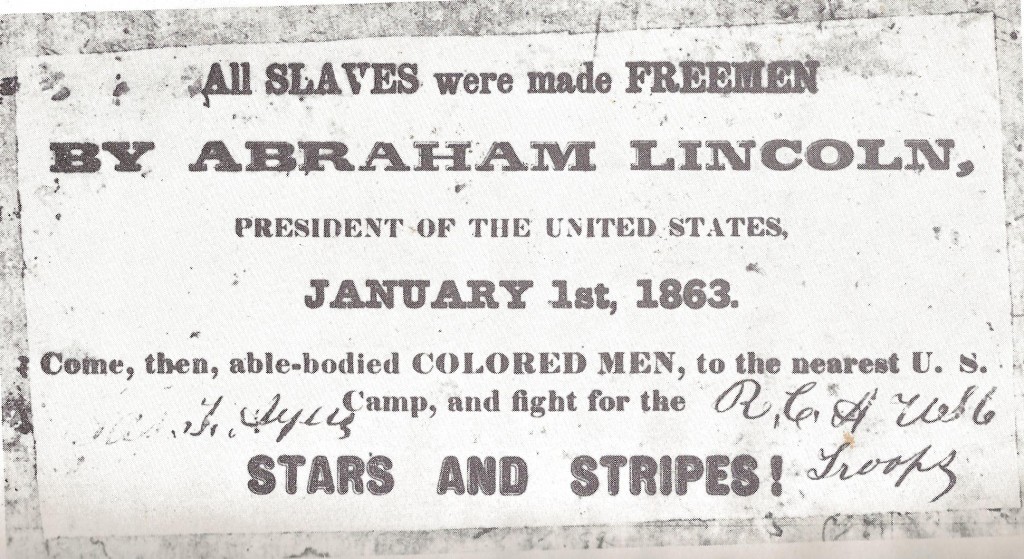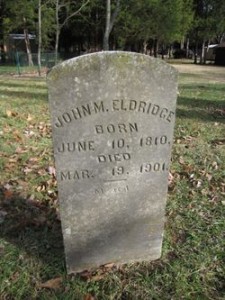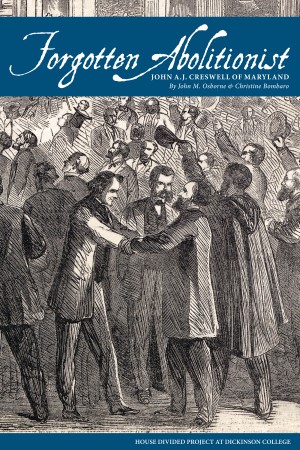This remarkable story comes from the wartime diary of Union recruiting agent James T. Ayers, edited by John Hope Franklin (Illinois State Historical Society, 1947) and that has been featured in James Oakes’s new book, Freedom National: The Destruction of Slavery in the United States, 1861-1865 (Norton, 2012). Ayers was a lay Methodist preacher from Illinois who had joined the Union army as a private at the age of 57 and had become a recruiting or enticement agent for potential black soldiers in late 1863. He was one of more than 200 such agents deployed by the Union army to help enlist newly freed slaves during the second half of the war. We have no photograph of Ayers but editor John Hope Franklin described him as “an impressive-looking man, almost six-feet in height [who] weighed 170 pounds.” Ayers described his “adventures” in spreading the “good news” of emancipation in a lengthy diary entry from May 1864 written while he was recruiting in Madison County, Alabama for the 15th United States Colored Infantry (USCI). This may be the most explicit and detailed account that we have from the period that depicts how the emancipation moment might have occurred in many parts of the South. Be warned, however, it is not easy reading and contains difficult, sometimes offensive, language.
[NOTE –Editor John Hope Franklin kept Ayers’s original spelling and punctuation]
[Huntsville, Ala May 7th 1864]
“…And now my friends I’ll give you A sketch of one of my adventures Among many others of similar nature. I left Huntsville in the morning to see what I could see and hunt Recruits all Alone. Took the Pulaski Road and followed on ten miles without meeting Anything to suit in my line. Looking off to my write half mile or so I saw A Large Black place in A cornfield. Said I to myself ‘there is Sambo.’ So I let off Laid down the fence mounted my horse Road through Leaving gap down for we never put up gaps or shut gates that would not be militerry. Beside A man dont know how soon he might wish to go out at the same place Again. Well I made up to the Black patch, and sure Enoughf as Expected here was About twenty women and gals and 7 men all geathering corn. Said ‘Hellow Children How do you all do geathering Corn that the way to do. Whose farm is this?’
‘Master Eldridges, sir.

1860 Census records for John M. Eldridge household, near Meridianville, Alabama (courtesy of Ancestry.com)
‘Is that his house yonder?’
‘Yes massa.’
‘Are you all his slaves?’
Yes massa.’
‘Is he good to you?’
‘Not mighty good massa.’
‘Is he A Union man or secessionist?’
‘Oh Godamighty Master him Cusses de yankys all de time says day Come here to kill us all and carry us way and sell us all and dat masa Lincum gwiin send us all Clean of.’
‘Well your master then swares and cusses the yanks terribly does he?’
‘Well Massa’ says an oald Grayheaded Darky, ‘massa dont sware, he methodist man.’
‘Ah indeed he is A methodist is he?’ said I.
‘Yes massa and Classleader here and casorts some times Oh yes.’
About this time one of the niggers said ‘we must go to work, massa flog us he see us idle and he will ask us who dis man is and he whip us for talking with you.’
‘Well,’ said I, ‘dont be sciered Children I have Come to tell you good news, and I want you all to Listen. Father Abraham has Declared you all free you have no master now. You are free and I have Come to tell you.’
‘Bress God,’ said two or three voices at the same time.
‘Well children see here’ getting off my horse then and handing them one of my Recruiting Pictures ‘here is what Father Abraham is doin for you’ showing them the Darky in Center with flagstaff flag waving and on the write, men knocking off the chains from the slaves wrists and some Just has got Loose and hands stretched upward shouting and Praising God for there Deliverance and on the left side A free school in full Opperation with miriads of Little Darkies Each with his Book, then on other side in Large Letter ‘All slaves were made free by Abraham Lincoln President of the United States Jan 1st 63. Come then Able boddyed Collered men and fight for the stars and stripes.’ You would have to be present to understand the Joy of those pore down trodden Abused People. ‘Well now Children’ said I ‘Father has been good haint he.’
‘Oh yes bress God.’
‘Well now he wants you who are able to fall in Ranks and help us A little. We need some help, he offers ten dollars A month and Cloath you and feed you and make you free if you will inlist and be soaldiers. How many of you boys will Turn out?’
‘When do you want us Massa?’
‘Want you Rite now.’
‘Oh massa wont let us go.’
‘Never mind your Master you have none. I’ll see to that your master shant hinder you.’ Well four concluded to go. One said he wanted to go up to the house and get his Coat and see his wife. ‘Yes of course you all go to the house and get your dinner. I want you all to go with me to Huntsville. Who lives up at yon house Boys?’
‘Master Blackwell.’
‘Has he got any Boys?’
‘Yes massa.’
‘How many?’
‘Oh 8 or 10 some oald do [though].’
‘Well now geather up take your wagon and go up home and get some dinner. Make haist. I go round by that house and be up at your house directly and if master Comes to you and says anything tell him an oald man Come to you and sent you up and said he would be here soon. Never mind Anything he says. I’ll protect you Boys.’ So Away we all went. Well I might tell some things took place at this place Rather Amusing but I pass. I got two fine big boys here and started rite Along, and now for Eldridges. When I got thare all was in Excitement. I Rode up and says ‘Well how are you all Children of mortality? Hope you are all well.’ Raised my hat A little. Says to Master, Missus and galls, ‘How Do you friends, Fine day this.’
‘Yes’ say the oald feller and stepping near me says he ‘what’s all this mean? My niggers say you Come into the field and set them all free, is that so.’
‘Yes sir.’
‘Well I would like to know how you got the autherity to do so, Sir.’
“By the War Department, sire, I get my Autherity, the verry best of Autherity aint it.’
‘What do you want with my niggers?’ says he.
‘Your niggers you’ve got no niggers my dear sir. These are all free men as you or I am and thease women here that have been your Slaves are all free now as much so as this Lady’ turning a little, ‘your wife I suppose or these yong Ladys your daughters I presume. They are all free, so Declared by the President some time since. I would of thought you knew something About it’ turning Again to the Darky women and Children. ‘Master never toald you was free did he?’ They said nothing. Said I, ‘No not he Pious man is he keeping men and women here ignorantly in Bondage when he knows they are free as he or his wife or daughters are.’
‘Well’ say the man, ‘I want you to leave and that soon to.’
‘Leave, why sire I will when I get Ready. But I am going to take your men or thease men when I go. You may be your Eyes on that and if you Sower up much at it and show the secesh dog you might get Hurt before you know it;’ and here I drew my trusty Revolver out of scabbard. ‘I shall not hurt A hair of your head, sir, if you be quiet, but I have come for your Darkeys and your Darkeys I’ll have.'”
[John Hope Franklin, ed., Civil War Diary of James T. Ayers (1947), pp,. 26-30]
James T. Ayers recruited hundreds of black soldiers and spread the word of emancipation to thousands of former slaves before he died from disease in September 1865. Madison Eldridge and Archie Eldridge were two out of the four ex-slaves whom Ayers recruited from the Eldridge plantation near Huntsville, Alabama on that day described above in early May 1864. They both served in the 15th United States Colored Infantry (USCI) regiment (Company K) organized in Nashville, Tennessee and both men survived the war. According to the 1860 slave census, John M. Eldridge had about 25 slaves at the time when the war broke out, 14 males and 11 females, with ages ranging from 4 to 76. He was reportedly a descendant of Pocahontas and had named one of his daughters after the famous Indian princess. His wife, Francis Powell Eldridge, was a descendant of Revolutionary War soldier John Peyton Powell. Their graves are marked at the Eldridge-Powell Cemetery in Meridianville, Alabama, not far from the site where their 1864 encounter with Ayers and emancipation occurred.





